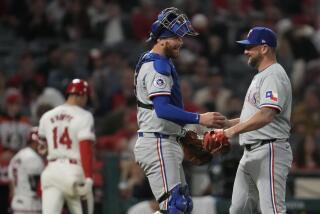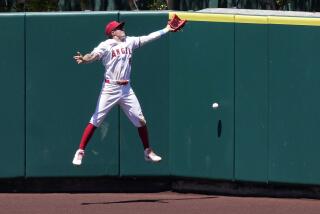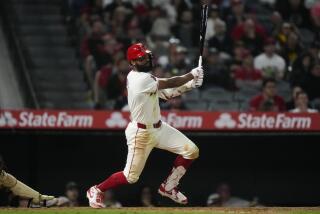Mauch Sees a Different Side to Joyner’s 30th Homer of Year
- Share via
ARLINGTON, Tex. — When Wally Joyner hit his 30th home run during the Angels’ 5-1 loss to Texas Friday night, becoming only the ninth player in club history--and the youngest Angel ever--to reach that figure, there were plenty of smiles, but Manager Gene Mauch wasn’t one of the cheerleaders.
When it comes to Wally Joyner and home runs, as far as Mauch is concerned, good news is no news. The Angel manager doesn’t mind Joyner hitting balls out of the park; he’d just prefer if Joyner didn’t hear about it.
“That’s what I’m trying to avoid--having him regarding himself as a home run hitter,” Mauch said. “I don’t want him thinking about it at all.
“When people start talking about home runs and he starts thinking he’s responsible for hitting home runs, they’ll stop, just like that. I guarantee you.”
Mauch cited two case studies.
“Johnny Callison was 5-9, 168 pounds and he hit 31 home runs one year,” Mauch said. “After that, it was, ‘You’re supposed to do it.” The next year? He didn’t do nothing.”
Exhibit B?
Wally Joyner, July 17-Oct. 5, 1986. After hitting 20 home runs before the All-Star break, Joyner managed just two more the rest of the regular season.
“I’m positive that’s what happened when he had that dry spell after the All-Star Game,” Mauch said. “Absolutely positive.”
Joyner isn’t quite so sure about that theory.
“I don’t think I had a chance,” said Joyner, referring to last season’s second half. “I was injured. (Hitting home runs) was two thoughts down the line. First was trying to help the team win and second was me getting healthy.”
Joyner will give Mauch this much, though: Lower expectations can lead to higher home run numbers. After Joyner’s 1986 fade-out, many figured the 22 home runs he hit as a rookie were about 10 over his head.
During spring training, Joyner nodded along with those predictions and said he’d be satisfied with 12 home runs, provided he hit for average and drove in an ample amount of runs.
“I just go out and try to hit the ball hard,” Joyner explains. “Runs scored and RBIs are what I consider the most important stats. If you score runs and drive in runs, you’re helping your team win ballgames.”
Home runs, Joyner claims, can come and go.
“I may not hit 20 next year,” he said with a shrug.
But by hitting his 30th off Ranger starter Jose Guzman (14-11) in the eighth inning Friday, the 25-year-old Joyner moved into some exclusive company.
With it, Joyner became:
--The first second-year player in Angel history to hit 30 home runs in a season.
--The first Angel to hit 30 home runs in a season since Reggie Jackson (39) and Doug DeCinces (30) both did it during 1982.
--The sixth Angel to hit 30 home runs and drive in 100 runs during the same season. Joyner ranks third on the team’s all-time single-season RBI list with 109.
And Joyner, who feels he was low-balled by Angel General Manager Mike Port during 1987 contract negotiations, knows what might mean when both parties return to the table for 1988.
“It’s a weapon,” said Joyner, who will earn a base salary of $165,000 this season. “It could make a difference. If I hadn’t done so well, they could have retracted some of my salary.”
If Joyner can compile comparable numbers in 1988, the payoff can come in 1989, when Joyner, as a three-year veteran, becomes eligible for arbitration.
“I don’t like talking about it,” Joyner said, “but in arbitration, you can put my stats up with somebody who made five times what I made this year. I think there might be something there.”
Joyner is also batting .293. He admits to have the number .300 aligned in his mental sights.
“Maybe subconsciously I’m thinking about it,” he said. “A lot of people are talking to me about it. I have to put some good at-bats together. But there are 14 games left and if I don’t, I could fall to .280.”
If Joyner falls short in 1987, Mauch seems convinced a .300 season is in his first baseman’s future.
“The time’s going to come when he’s going to hit .320,” Mauch said. “And that may not be too far off. When he does, when he’s hitting the ball that often, there might be 35 home runs mixed in there.”
Just don’t let it get around.
Angel Notes
Friday’s loss was the Angels’ second straight and the 12th in the club’s last 16 games. In their last 40 games, the Angels are 14-26. Where does that leave the Angels in the American League West? Deep. With 14 games remaining, the Angels trail the first-place Minnesota Twins by 8 games. They are also in fifth place, 1 1/2 games behind the fourth-place Texas Rangers and just a half-game ahead of the sixth-place Seattle Mariners. . . . Jerry Reuss (4-4) was the starting and losing pitcher for the Angels. Reuss worked 5 innings, allowing 5 runs (4 earned) on 8 hits and 3 walks. Yet, this was Manager Gene Mauch’s postgame critique: “Jerry Reuss competed as hard as a man can compete. He pitched hard and good. We played a couple of balls weakly on defense and that cost us four runs.” Mauch was alluding to a pair of plays involving catcher Jack Fimple. In the third inning, Fimple tried to turn a home-to-first double play but sailed the ball over first baseman Wally Joyner’s head for an error that led to two runs. In the fourth inning, Fimple couldn’t field a hurried throw home by Reuss that enabled the Rangers to score another run. . . . Texas starter Jose Guzman won his sixth consecutive game and improved his record against the Angels in 1987 to 3-0. He also pitched a complete game during his last start against California, a 7-2 Ranger victory Sept. 11 in Anaheim. . . . Jack Howell went 0 for 2 with a strikeout, giving him 2 hits in his last 27 at-bats (.074).
More to Read
Go beyond the scoreboard
Get the latest on L.A.'s teams in the daily Sports Report newsletter.
You may occasionally receive promotional content from the Los Angeles Times.






